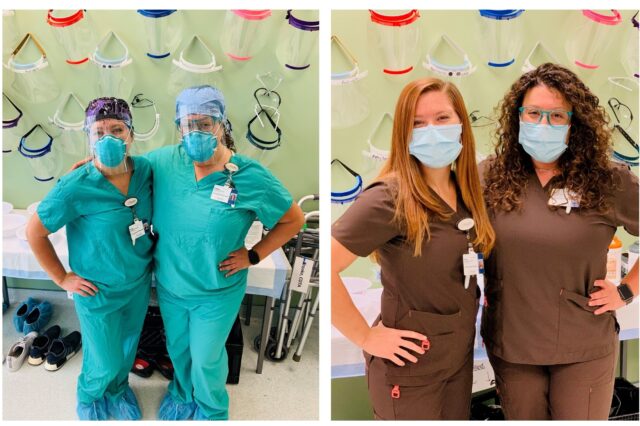Occupational Therapy’s Role with COVID-19
Occupational therapy is a patient-centered profession focused on promoting health and well-being through occupation, enabling patients to participate in activities of daily life regardless of physical ability.

We continue our recognition of National Occupational Therapy Month by highlighting how occupational therapy has benefited COVID-19 patients.
Because COVID-19 is a multi-system disease that can limit a person’s ability to engage in daily routines, a holistic and patient-centered treatment approach to facilitate long-term recovery is very important. Occupational therapy is a patient-centered profession focused on promoting health and well-being through occupation, enabling patients to participate in activities of daily life regardless of physical ability.
Responding to COVID-19
Acute care occupational therapists Kayla Groth, MOT, OTR/L, and Lindsay Brenner, MOT, OTR/L, are valuable members of the UF Health Jacksonville Rehab COVID-19 Response Team. Over the past year, Lindsay and Kayla, along with the entire Rehab COVID-19 Response Team, have pioneered the adaptation of acute care therapy in order to treat patients with varying degrees and severity of symptoms of the novel coronavirus.
COVID-19 patients may experience the following symptoms, which occupational therapists, or OTs, can help treat.
- Deficits in functional endurance. OTs can monitor vital signs and modify activities to prevent overexertion as they assist patients with activities of daily living at every stage of the illness. They teach patients to self-monitor their vital signs and symptoms in order to independently carry over movement techniques once they return home.
- Acquired weaknesses from the ICU. COVID-19 patients who require prolonged mechanical ventilation experience a vast loss of muscle strength and endurance. OTs help to build this strength back through therapeutic exercise and neuromuscular re-education. They also help patients to compensate for this weakness to maintain independence with daily self-care.
- “Brain fog.” Early mobilization and engagement in occupations that normalize everyday routines, i.e., brushing teeth, feeding and getting dressed, helps to treat “brain fog,” or cognitive fatigue, impaired concentration, memory deficit and poor awareness. These are symptoms patients with COVID-19 commonly report in short and long-term recovery phases of their illness.
- Psychological and emotional distress. New onset depression, anxiety and PTSD are often reported in patients hospitalized for 14 days or more, as well as any patient experiencing the sensation of excessive breathlessness. OTs can help mitigate these feelings by guiding progressive return to activity to prevent withdrawal from daily activities.
Meet our acute care occupational therapists
Lindsay has a decade of experience in occupational therapy, and has been with UF Health for 10 years. She treats patients with a variety of conditions and is passionate about working with traumatic brain injury and stroke patients.
Why occupational therapy? “I always knew I wanted to help people,” said Lindsay. “I have a knack for creativity and compassion and wanted to utilize that in my profession. I did my clinical rotation at UF Health Jacksonville, which gave me great experience with a variety of patients and diagnoses, and I have been here ever since.”
Kayla has five years of experience in occupational therapy and has been with UF Health for nearly five years. She also treats patients with a variety of conditions and is passionate about working with trauma patients.
“I wanted to work in health care because I love to help people,” said Kayla. “I first became interested in occupational therapy because of our role in caring for babies in the NICU. During my clinical rotations, I discovered that I really enjoyed acute care and chose to pursue a job at a trauma hospital.”
Visit UFHealthJax.org/rehabilitation-services to learn more about occupational therapy and other services offered at UF Health.
About the author
